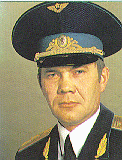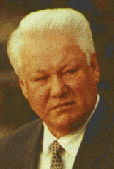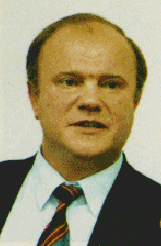Russia: After
the First Round
The first round of the Russian presidential election is over, and, as expected, the results were inconclusive. The two major candidates, Boris Yeltsin and Gennady Zyuganov, finished within 3.25% of each other and will do battle again in a run-off election early in July. The centrist reformer Yeltsin captured 35.28% of the more than 75.7 million votes, to the Communist Zyuganov's 32.03%.
The surprise third-place candidate, Aleksandr Lebed, ran more than 20% behind Yeltsin but emerged as a potential power broker. Lebed, a 45-year-old former army general who is seen as a moderate Russian nationalist, has made no secret of his dislike for the Communists. In a shrewd political move, incumbent President Yeltsin quickly named Lebed to the leadership of Russia's Security Council. Yeltsin had sought Lebed's support before last Sunday's election, going so far as to predict that the former general would become president in the next election five years from now.
In fourth place was human-rights advocate Grigory Yavlinsky. The far-right, ultranationalist candidate Vladimir Zhirinovsky trailed far behind in fifth place with 5.7% of the vote. Former Communist Party chief Mikhail Gorbachev, whose courageous policies in the 1980s started the momentum toward democracy in the former Soviet Union, finished a poor seventh with just over one-half of one percent.
The Run-off
Incumbent President Yeltsin has the support of the party known as Our Home Is Russia, the third-largest party in the Duma (parliament), behind the Communists and Zhirinovsky's Liberal Democrats. Mr. Yeltsin has spearheaded reforms that have restructured Russia's economy and, according to many analysts, set a course that will eventually restore Russia to a place of economic power after decades of failed Communist policies. At the same time, however, the reforms have impoverished nearly half the population and caused many to look back at the Communist period as a time of relative well-being and stability. Crime has increased spectacularly, and corruption is rampant among officials and the rising class of private enterpreneurs. And yet Russia is democratic as it never was before.
Yeltsin himself is a dynamic but volatile personality, a former Communist who has been accused of opportunism in his conversion to democracy and economic liberalism. He suffers from heart problems and has a sometimes-serious drinking problem. But in many ways overriding these personal weaknesses is the image of Boris Yeltsin in 1991 standing atop a tank in front of the Russian parliament building, railing against those forces who sought unsuccessfully to overthrow the fledgling democracy.
Gennady Zyuganov has a mixed record, both in action and in his policy statements. Mr. Zyuganov has attempted to promote himself as a moderate Communist in the European social-democratic stripe. He has the support of a broad left-wing coalition, the Popular Patriotic Forces. At the same time, Zyuganov has spoken almost nostalgically about the recent Communist past, lamenting the demise of the Soviet Union and the loss of the former Soviet republics that are now independent countries. Zyuganov distrusts the U.S. and NATO, and for their part, the leaders of the West distrust him.
Hot Sources of Information
For detailed election news direct from Moscow, visit the site of Russia's National News Service, in English or Russian (if you have the proper software). For a load of background information on the Russian election, connect to Russian Presidential Elections - 96, a Magellan 3-star Web site.
For news about Russia on an ongoing basis, turn to the Maximov searchable news index. And for analysis, try Radio Free Europe/Radio Liberty.
Posted June, 1996.
© Copyright 1996 OBS




